In Arcadia Read online
Page 7
When he came to think of it, even the materialisation of these instructions was a puzzle. There was something sinister about it. He had been made to understand that information would be given to him before the next stage of the journey. He had expected this to take place at the hotel in Paris. But to find that the next stage was in the middle of the tunnel, with information planted in the confusion following a general darkness, troubled him. All his fellow passengers suddenly appeared sinister.
Jim got up and, weaving with the motion of the train, went to ask the other crew members if they had seen anyone place the envelope on his table, or whether they had anything to do with it themselves. They were as puzzled as he was, and began to believe that Jute had indeed seen Malasso in the darkness. The only problem was that no one knew what he looked like, and no one knew if he even really existed. He was merely a rumour that had become a reality, an elusive reality. And they all sat together, trying to understand the nature of the mystery they were faced with.
The new instructions were simple enough. At the end of this train journey they were to approach the train driver and conduct an interview with him at his house in the suburbs of Paris. Before then they might be joined by someone from the organisation whom they wouldn’t notice, and if they did they were to ignore him. After the interview they were to converge at a certain point outside the Louvre, where they would be provided with a map and directed to the next interview, the process having already been arranged for them.
The crew would get its Arcadian interviews, but Malasso would get what he wanted. For the first time, Jim sensed their journey was an arcane voyage, the interviews and places forming an inner script, a sacred script even. He felt that they were all unwitting parts of a sublime riddle, a mystical conundrum, a travelling cryptograph. Back at his table, he tried to work out, by alphabet, a name or map or hint of what their journey secretly represented. But he couldn’t find any order to it, couldn’t find any visible clues, and he was baffled by the apparent inconsequentiality of it all.
11
The other crew members, however, were enjoying a brief rest in the tunnel. Their heads were drooping. They had no feeling for conundrums or cryptographs. They were mostly plain souls, with a touch of cynicism here, and a flash of scepticism there. They were mostly people who took life as they found it, and were unwilling to probe too deeply into what they couldn’t fathom. They were people of appearances, people of the senses, of the skin, of the surface.
They were people of appearances, except for the couple who sat staring into the darkness, the drunken presenter and his painter companion. They cultivated wakefulness. Irony was his favoured beverage. Wisdom was the great secret food of his spirit. Caustic vision was the deceptive mode in which he functioned in the world, preferring to be seen as a wild and bitter man than as a lovable clown or a forgivable fool, the other two disguises open to a man of spirit and intelligence in an age without a centre, an age without beliefs, an age of emptiness. He hid his wisdom, his genius for living, and his mighty love beneath what appeared to be a coruscating madness. This effort cost him dear, for the mask often became the face, became the visage by which the world recognised him. He became like an actor who played his part on stage longer than he lived his truth in life. His role sometimes overwhelmed his reality.
His father had named him Lao. It was a name he had hated as a child, because it was so alien, but which he had come to like as an adult, because it was intangible.
Lao sat there, staring past his companion, into the darkness. Having overheard the latest drama with the envelope, and watched the baffled reaction of the crew, he noted how silent Jute had become, and how solemn Jim now was, as he contemplated the envelope and its instructions. Jim had not come to Lao, discouraged by his forbidding and apparent cynicism, his verbal cruelty, and his permanent air of non-involvement. This air was one of his best cloaks, a garment of invisibility. It enabled him to see everything, without being seen, to hear everything, without being heard. It gave him the space for vast inner and outer freedoms.
12
Jute sat impassively, staring but not seeing, thinking about all the messages she had received in her life, and not being able to remember any of them. She felt, suddenly, sitting there, as if she had been, all her days, missing out on secret and valuable things. Her mother had died when she was a little girl and all her life she had grown with two warring convictions in her mind, the finality of death, and the impermanence of death. Which is to say that she believed that when someone dies nothing of them remains, they went to nowhere land, they vanished completely, devoured or erased by the gods of the vacuum. Not even memory keeps them alive, because, eventually, memory too dies. On the other hand she was convinced that the dead are still here, somewhere, in spirit. She dreamed often about her mother, and in these dreams her mother told her useful things, prepared her for events to come. And Jute knew for certain that her mother whispered messages to her all through the years, warning her here, guiding her there. These were not loud voices that would cause alarm, but faint wind-whispers, things heard and not heard, heard almost through the agency of her own private thoughts, so that it was almost impossible to distinguish between her own thoughts and the whispers.
And so Jute saw the world dually. She never admitted to the latter view, the wind-whispers. As a faithful company woman she never for a moment slackened on the dour materialism expected of her. In all conversations to do with higher phenomena she affected complete scepticism, even scorn for all those who suggested that there might be more to life than met the eye. She loudly affected to prefer what could be seen and demonstrated, ‘real life’ as she put it, to any fancy notions of beings, life beyond death, intangibles, the miraculous, invisibles. And so she too lived a role. And the role overwhelmed her reality. She went days and weeks without the whispers of her mother – the most awful days of her life. And the anguish of it made her more miserable than anything the world did to her. And she had to think her way back to her true secret beliefs, to open herself privately to what she knew in the core of her being, before she could begin to dream of her mother again, and of her childhood, when she had been so happy, as if she had lived in an enchanted garden. To dream and wander about with those feathery whispers, those friendly words and that breezy laughter filling her with reassurance and a cheerfulness which she concealed beneath a grim and dour exterior.
But now, sitting alone, her mind empty, she tried to summon her mother. Ever since she first heard about the journey she had stopped seeing her mother, stopped hearing her, and dreaming about her. Jute was in the middle of her own wasteland. There was no love in her life. She was in a desert without an oasis. For two months now her spirit had been barren. She had lived so much in scepticism, had affected so much disdain for the notion of Arcadia on which they were now embarked, had suppressed her openness, had professed too much her dislike of airy-fairy notions, that she had drifted, without knowing when, into a dark and complex place, a tangled place. Her sleep had never been so troubled. Monsters and men with knives, whispering murder and abduction, appeared to her more frequently. Since she received the message in Husk’s flat, her life had been in a turmoil that she dared not admit to anybody. There was a mighty revolt in the palaces within her. There was insurrection in the land. Her sleep had gone to pieces; and the only voices she heard were harsh ones, and her only dreams took the shapes of the idealisation of the message, took nasty forms, and plagued her. Malasso became a constant visitor in her nightmares. He seemed everywhere, the incarnation of an evil she couldn’t deny was also part of her. How often did she see herself being murdered, raped, pursued, hounded, tied up, brutalised, mocked, laughed at, and isolated in her dreams? How often had she waited, lingering, for the sea-breeze voice of her mother? Jute sat now and stared. Nothing was coming through to her. She saw nothing, distorted everything, and was alone in her darkness, suspicious and disintegrating, and too proud to admit it.
13
The announcement woke
up the travellers. The tunnel was coming to an end. They had emerged from the sea-depths. Beverages were still available at the bar…
The crew stirred. Jim, scratching his balding head, awoke from his wakeful slumber, from his cumbrous pondering of the envelope and his next set of instructions. Riley was polishing the lens of her beloved camera. Sam, eyes arrowed, was pursuing the angles of his next shot, thinking of faces, flowers, children, heights, helicopter flights, upside-down visions, penitential prospects, existentialism. Husk, always aflutter with activity, had begun a hundred things, arranging teas, phoning ahead, fixing interviews, studying her instructions with pursed lips and an unfriendly expression on her oddly judgmental face. Propr, bewhiskered, gnarled, and twisty like an Egyptian rope, or a thin wind-blown oak, with his glasses always magnifying his eyes, and his moustache conferring on him a comical expression faintly reminiscent of silent movie clowns, Propr sat there, drowsy, but always listening. Propr was the finely tuned ear of the world. Everything for him was a sound. He was a poor listener to conversation, but an intense listener to the world’s noises and susurrations. The finer noises fascinated him most. The least heard, the keener his engagement. He had partially retired, having worked in the same line of business for more than thirty years. And he had only accepted this job when it was explained to him that Arcadia had something to do with goats and sheep and shepherds. He tended a farm up in the Celtic inlands, listening to the lowing of cows, and the piping of all variety of birds whose names and sounds he knew by heart and could match at a moment’s notice.
But he too was going through dislocating times. Trouble raged in his land. Inheritance problems, a wife that ran off with a neighbour, a death in the family, a daughter that fled from home swearing never to return, financial worries. Propr hadn’t known peace for almost a year now, but couldn’t admit it even to himself. And so he lost himself in listening, in delving into the noises and sounds of the world. He submerged himself in their subtleties and intensities. In that world of sounds nothing mattered, everything was pure, and the fact that his life was falling apart, that his farm was being repossessed, was a fiction that danced like an imp on the edges of his mind, where other fictions, like capricious goats, are allowed to play harmlessly…
14
And then there was Mistletoe, silent, submerged, and waiting. A life begun in happiness, a childhood rich in variety and freedom, much early travel, much of the world seen and loved. Then a life that took a wrong turning, and the right road regained later than she would have wished. Blessed with an ease of spirit that falls so easily into a love of rebellion. She was one of the intelligent ones who have to be lazy in order to be awoken by failure. The early recklessness. The ambiguous blessings of beauty, feline grace, and deep-scented sensuality. The early reliance on easy talent. Then being too favoured and lucky. Then unfavoured and unlucky. Then misused by men. Then disillusioned and disenchanted. Talents not developed early, lost on the way, wandering, beautiful, optimistic still, and lost. Wreckages of past dreams about her. Then despair and loss of faith in life. Then drink and drugs and hopelessness and believing in everything, believing in nothing. Emptiness. Lovelessness. And then touched by good fortune which never really deserted her. Finding new friends. Finding a friend in Lao. Then the slow journey back, through art, to sanity. Meanwhile, what a ring of connections. Disowned by parents, cut off from homeland, almost friendless, heart dry but for the pulses of new friendships and the quickening of art. Her sensuality fabulous, her body suspicious of love. Her eyes suspicious, in spite of a capacity for abundant warmth and great love. A heart frozen, a mind awake. Waiting for life’s thaw, clinging on to friendship, silent, submerged, like a submarine, an iceberg, magisterial…
15
And then with a blasting of a whistle, long and piercing like a weird sea-animal waking from an agonising hibernation, with a noise of grinding metal, and a howl heard from the rails, and a rattling and a scattering, the train thundered out of the tunnel into the gorgeous light of the French countryside. And all hearts quickened. Motion, voices, laughter. Solitudes were broken. And the wonder of seeing the world again, its fields, its flowers and trees, its varied colours of green and yellow, blue and orange, the clear heavens, the rich sunshine pouring on the expanse of turquoise and gold, the converging sky and land, the spaces of light in which the eye can roam. As if creation had been restored.
And a sense of magic stirrings beginning somewhere within. A quickening of recognition, a sense of place, an expectation, an attitude of romance, an inclination to joie de vivre, a freedom, a hope of escape, the breeze of a new unconfinement. Youthfulness, bohemianism, the secret desire to be an artist, or at least to be artistic, the self unloosed in a different language, associations with beauty, charming eccentricity, with wine and mellow drunkenness, with a land of art, where artists used to converge from all over the world as at an Arcadia in a darkening age, a place where freedoms meet, and art flowers in a thousand varied colours and forms, where outrage is stylised, where poetry is favoured over prose, elegance over energy, where the faun wakes in the long afternoon, and corruption seethes but never paralyses, where revolt simmers, and the ghosts of history wander the air speaking in paradoxes, a place imagined, more true in the mind than on earth.
A rich tapestry of sensations awoke as the voyagers sped over bridges, through orchards, across fields with golden haystacks.
16
The crew meanwhile leapt into action. Filming was resumed. All private troubles were sublimated into work’s necessity. Jute had forgotten her anguish, Jim his anxiety, Husk her paranoia, Propr his cuckoldry, Sam his impending divorce, Riley her paralysing fear of death. All except Lao, who sat still in his seat, looking out over the fields of green and gold. His mind wandered between a cynical perception of everything to an enchanted vision of all things, between loathing and loving, malice and magic, between the mask of the heart and the nakedness of the heart. He looked at Mistletoe. She was serenely sketching, lost in her kingdom. He said:
‘Isn’t it strange how most significant human activity has to do with loss? Because we lose things we try to find them. The trying sends us on a journey. We encounter other things, things we hadn’t noticed that we had lost: and then we create. Art springs out of both alienation and loss. Art replaces what we have lost in spirit. It is therefore a magic replacement. And so it is with Arcadia, it seems to me. We’ve long lost our easy relationship with nature, with the universe. And so the ancient Romans betrayed themselves as the first alienists when they dreamt up and crafted the legend of Arcadia. It showed just how fucked up they were that they needed to invent an ambiguous Eden for themselves, where love is akin to madness. And so it would seem that art is a condition of unease, of dislocation, of being out of it all, an exile. Art cannot come from the happy and contented, from the lucky and the beautiful, from the blessed and the whole, unless an unrevealed tragic condition or premonition dwells under it all like an unseen volcano or an unsuspected cataclysm about to wipe away all that unnatural tranquillity. The last days of beautiful things are the most artistic. It seems then that art is a secret sign of dwelling under a guillotine, under a swinging sign of doom, under a hidden question mark, beneath the dread of death, in unwholeness, wanting to be healed and to heal, with a whiff of mortality and the inferno in one’s spirit, with a sense of sin, of unredemption. It seems that art is a magic plea, a magic howl, an enchanted cry, a delaying of madness, a deflection of insomnia, a canalising of negative energies. Art is finding one’s way in the dark, seeing with one’s fingers, divining water in the desert, creating an abstract realm made up in the mind of others to replace the realms of childhood and innocence lost for ever with the death of a mother. Art is finding a new homeland, and yet always setting sail. It is being deceived and lured by the gods into roaming the whole wide earth many times over and leaving bright cities behind in search of that which can never be found, but which seems as if it might be found, because of a dream which keeps moving like a
bird, a magic bird, or a love, or a dream of rest, or the hint of a beautiful city in the middle of an ocean. But it keeps driving us on, keeps us going, till the skeleton wanders into a golden gate, and into a sunlit landscape where the sunlight is a perpetual darkness, while another part of us has ceased its wanderings, having found what it was looking for in a place where nothing is ever lost or found, a place without a name or an idea. Which is why there is a fatality in finding, and an agony in seeking. But between seeking and finding there is another place, a special place, and maybe it is such a place that we journey towards now, that we call Arcadia, a place that for some is a book, a piece of music, a face, a photograph, a landscape, a lover, a city, a house, a land, a ritual, a path, a way of being, even. Maybe, my dear friend, we are journeying towards an elusive thing in the desert, where thirst is quenched miraculously in the air, and the fragrance of a great love lingers in the shade…’
17
Mistletoe looked up at him from her drawing. She looked at him for a long time, as if his features had altered somewhat. Then, returning to her sketching, and thereby creating an air of significance, she said:
‘You should write that down.’
‘I’m only interested in writing down things I can’t say.’
‘You’re perverse.’
‘That’s what the crab said to the horse.’
‘What?’
‘You’re perverse, why don’t you walk sideways, like me?’
‘And what did the horse say?’
‘The horse was too polite to say anything, and trotted off. But the story has a sequel.’

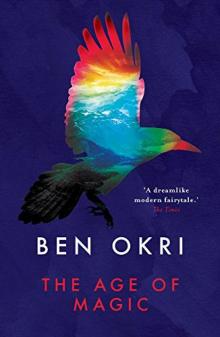 The Age of Magic
The Age of Magic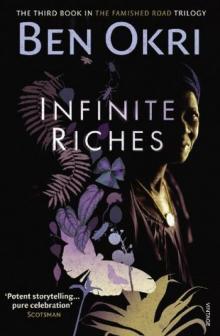 Infinite Riches
Infinite Riches Songs of Enchantment
Songs of Enchantment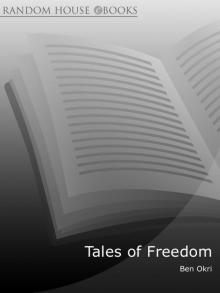 Tales of Freedom
Tales of Freedom Dangerous Love
Dangerous Love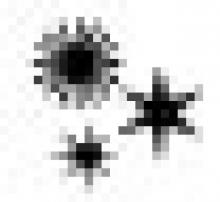 Starbook
Starbook The Famished Road
The Famished Road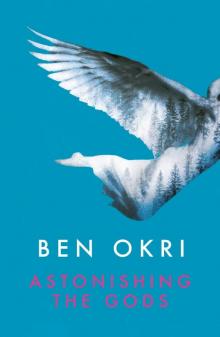 Astonishing the Gods
Astonishing the Gods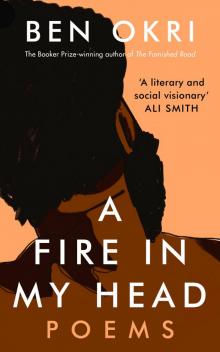 A Fire in My Head
A Fire in My Head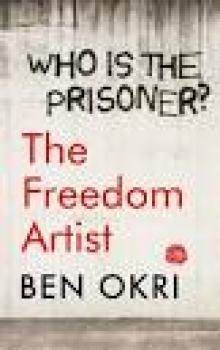 The Freedom Artist
The Freedom Artist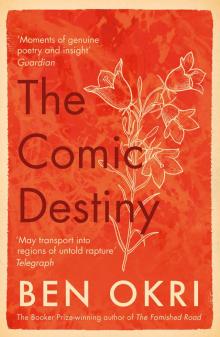 The Comic Destiny
The Comic Destiny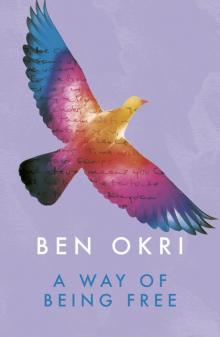 A Way of Being Free
A Way of Being Free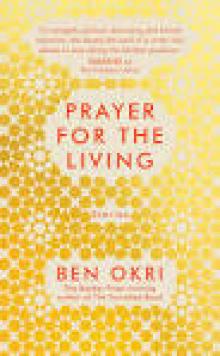 Prayer for the Living
Prayer for the Living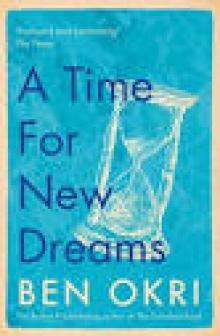 A Time for New Dreams
A Time for New Dreams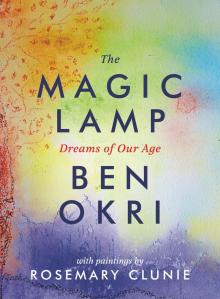 The Magic Lamp
The Magic Lamp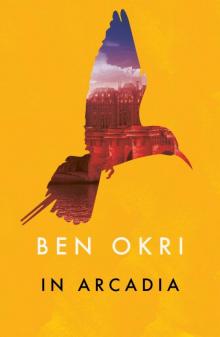 In Arcadia
In Arcadia